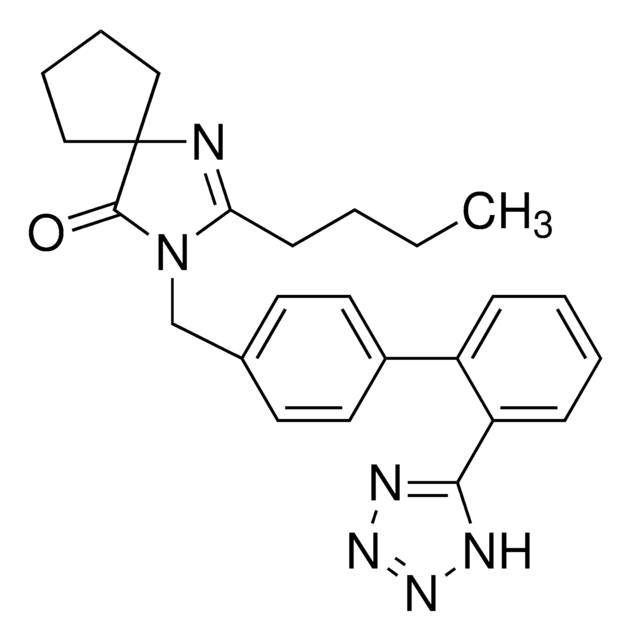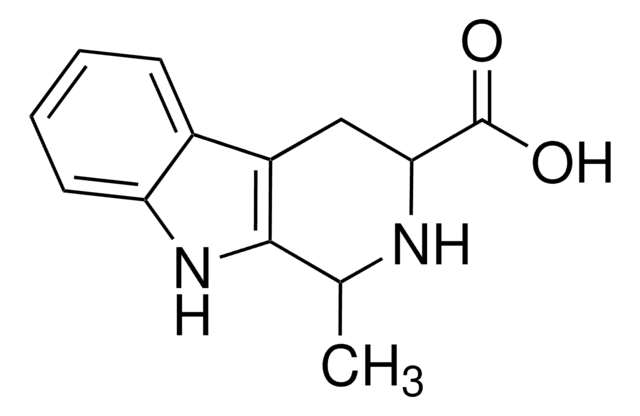SML2786
WRG-28
≥98% (HPLC)
Sinonimo/i:
DDR2 inhibitor WRG-28, N-Ethyl-4-[[(3-oxo-3H-phenoxazin-7-yl)oxy]methyl]-benzenesulfonamide
Autenticatiper visualizzare i prezzi riservati alla tua organizzazione & contrattuali
About This Item
Formula empirica (notazione di Hill):
C21H18N2O5S
Numero CAS:
Peso molecolare:
410.44
Numero MDL:
Codice UNSPSC:
12352200
NACRES:
NA.77
Prodotti consigliati
Livello qualitativo
Saggio
≥98% (HPLC)
Stato
powder
Colore
white to very dark orange
Solubilità
DMSO: 2 mg/mL, clear
Temperatura di conservazione
2-8°C
Azioni biochim/fisiol
WRG-28 is a potent, selective and extracellularly acting allosteric inhibitor of discoidin domain receptor 2 (DDR2) that potently inhibits invasion and migration in mice model of breast cancer. WRG-28 inhibits metastatic breast tumor cell colonization in the lungs.
Codice della classe di stoccaggio
11 - Combustible Solids
Classe di pericolosità dell'acqua (WGK)
WGK 3
Punto d’infiammabilità (°F)
Not applicable
Punto d’infiammabilità (°C)
Not applicable
Scegli una delle versioni più recenti:
Certificati d'analisi (COA)
Lot/Batch Number
Ci dispiace, ma al momento non ci sono COA disponibili online per questo prodotto.
Se ti serve aiuto, non esitare a contattarci Servizio Clienti
Possiedi già questo prodotto?
I documenti relativi ai prodotti acquistati recentemente sono disponibili nell’Archivio dei documenti.
Saumya S Gurbani et al.
Tomography (Ann Arbor, Mich.), 5(1), 53-60 (2019-03-12)
Histone deacetylases regulate a wide variety of cellular functions and have been implicated in redifferentiation of various tumors. Histone deacetylase inhibitors (HDACi) are potential pharmacologic agents to improve outcomes for patients with gliomas. We assessed the therapeutic efficacy of belinostat
Pengwei Lu et al.
Artificial cells, nanomedicine, and biotechnology, 47(1), 3955-3960 (2019-10-02)
Belinostat is a histone deacetylase inhibitor drug capable of regulating cell growth in diverse cancers. Nonetheless, little information clarified the role of Belinostat in breast cancer. Hence, the functions of Belinostat in breast cancer cells survival was disclosed in this
Li Ren Kong et al.
Nature communications, 11(1), 2086-2086 (2020-05-01)
Gain of function (GOF) DNA binding domain (DBD) mutations of TP53 upregulate chromatin regulatory genes that promote genome-wide histone methylation and acetylation. Here, we therapeutically exploit the oncogenic GOF mechanisms of p53 codon 158 (Arg158) mutation, a DBD mutant found
Wen Chiy Liew et al.
The Journal of allergy and clinical immunology, 146(3), 606-620 (2020-02-24)
Atopic dermatitis (AD) is a common chronic inflammatory skin disease. Skin barrier defects contribute to disease initiation and development; however, underlying mechanisms remain elusive. To understand the underlying cause of barrier defect, we investigated aberrant expression of specific microRNAs (miRNAs)
Il team dei nostri ricercatori vanta grande esperienza in tutte le aree della ricerca quali Life Science, scienza dei materiali, sintesi chimica, cromatografia, discipline analitiche, ecc..
Contatta l'Assistenza Tecnica.






![trans-4-[4-(Dimethylamino)styryl]-1-methylpyridinium iodide Dye content 98 %](/deepweb/assets/sigmaaldrich/product/structures/416/722/5d59b6c3-5f2d-4396-a721-5cb82ba7038c/640/5d59b6c3-5f2d-4396-a721-5cb82ba7038c.png)